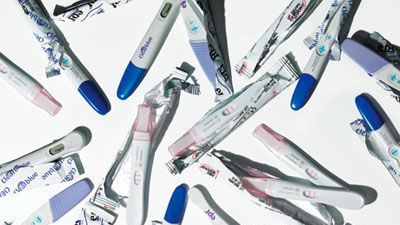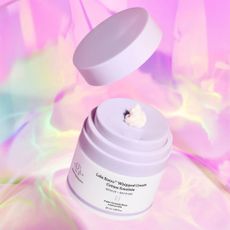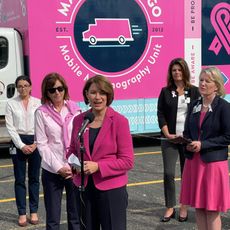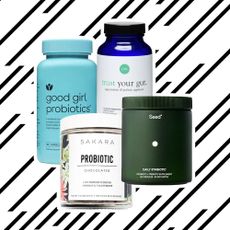Fertility 101
Suddenly, women in their 20s are flocking to fertility centers, hoping to increase their odds of one day getting pregnant. Here's what they — and you — need to know.

When it comes to fertility, 25 is the new 35. Women once waited until their biological clocks had almost popped a spring before bringing out the big guns, but smart young women today aren't leaving anything to chance. Just consider that the number of women 24 years old and younger who reported trouble conceiving or maintaining a pregnancy has almost doubled. Or the fact that 44 percent of those signing up for reproductive assistance now are under 35, according to the CDC's National Survey of Family Growth. From when to have sex to what not to eat, this comprehensive guide reveals the latest ways to plan for pregnancy — five, even 10 years in advance.
THE AGE GAME
Like it or not, age remains the biggest determinant of fertility. "No matter how much you take care of yourself, you can't slow down ovarian aging," says Dr. Kutluk Oktay, medical director at the Institute for Fertility Preservation at the Center for Human Reproduction in New York City. Here's why you shouldn't wait until your 40s to hit the baby panic button:
Your ovaries have a life span. Making a baby requires a healthy egg, but eggs become more scarce as you age. You're born with about a million eggs, but most of them never mature. By the time you reach puberty, you're down to half your original supply, and the number continues to fall each year. And not every egg that survives can make a baby. Even in your prime, about half of all eggs have chromosomal abnormalities, and the proportion of eggs with genetic problems increases as you age, explains Dr. David Adamson, president of the American Society for Reproductive Medicine. Eventually, you simply run out of viable eggs. "As of today, we have no way of changing that," he says. "It's the natural course of human life."
Fertility peaks in your 20s. Most women hit their fertile peak between the ages of 23 and 31, though the rate at which women conceive begins to dip slightly in their late 20s. Around age 31, fertility starts to drop more quickly — by about 3 percent per year — until you hit 35 or so. From there, the decline accelerates. "The average 39-year-old woman has half the fertility she had at 31, and between 39 and 42, the chances of conceiving drop by half again," says Adamson. Approximately one in four women age 35 or older have trouble getting pregnant.
The average woman can have a baby until age 41, but that's no guarantee. Your ability to naturally conceive a child ends about 10 years before menopause, but "we do not have good tests to predict when that life change will occur," says Adamson. While the average age at which women deliver their last child is 41, for some women it's 30; for others, 45. Currently, doctors can measure a few markers of fertility, such as the hormone FSH, but "these only tell us the bad news," says Oktay. "Even if FSH is normal, that doesn't tell us how many reproductive years this woman has left. Once it's elevated, we know it's too late."
Fertility patterns can run in families. "But it's not something to plan by," Adamson says. "While your mother may have had her last baby at 43 years old, you can't count on that being your destiny."
It's not you, it's him About half of infertility cases involve an issue with the guy. Though many men can father children past their 70s, sperm quality declines with age. Boost his swimmers by nixing things that overheat the scrotum, including laptops held on laps, prolonged hot-tub soaks, and too-tighty whities. Smoking, drinking, and crotch-numbing bike seats are other no-nos, says Dr. Kutluk Oktay. Frequent sex? Perhaps a good thing — an Australian study suggests that daily ejaculation can increase sperm quality. (But the more he expels, the fewer the sperm in each release.)
Stay In The Know
Get exclusive access to fashion and beauty trends, hot-off-the-press celebrity news, and more.
MAXIMIZE YOUR FERTILITY NOW
You can't push fertility beyond its natural limits, but you can do things to raise your odds of conceiving. Here's how:
1. Control stress.Stress alone will not make you infertile, says Alice Domar, Ph.D., of the Boston IVF clinic and author of Conquering Infertility. But for women especially sensitive to stress, it can throw off their cycle and may make it more difficult to get pregnant. Given that a new baby will invariably introduce new stresses into your life, Domar recommends that you devise a tranquility plan before you try to conceive.
2. Take folic acid early and often.It's widely known that folic acid (vitamin B9) reduces the risk of birth defects once you're pregnant, but some studies have also shown that women who take folic-acid supplements before becoming pregnant conceive at a higher rate. Jorge Chavarro, an instructor of medicine at Harvard Medical School, hypothesizes that folic acid may increase your body's sensitivity to FSH, the hormone that tells the ovary to kick out an egg in the middle of your cycle. He recommends taking at least 400 micrograms per day.
3. Quit smoking. Smoking is one of the worst things you can do if you're trying to get pregnant, says Shanna Swan, director of the Center for Reproductive Epidemiology at the University of Rochester School of Medicine & Dentistry. You're exposing yourself to tons of chemicals that accumulate in your body — and these chemicals interfere with your estrogen levels and can damage ovaries and your eggs along with them. Furthermore, smokers hit menopause about two to three years sooner than nonsmokers, says Oktay. If you do manage to get pregnant, smoking increases your risk of miscarriage and of delivering an underweight baby.
4. Don't overexercise. Moderate exercise is nothing but healthy. But work out too much or too intensely, and you're at risk for developing menstrual irregularities that make it difficult to get pregnant. If your periods become irregular, you should back off the marathon prep and endurance cross-training sessions.
5. Drink conservatively. There's no question that heavy drinking — the kind that throws your cycles off-kilter and leaves you chronically hungover — impairs your ability to conceive, says Oktay (even if it can enhance libido for a few hours). But what constitutes moderate drinking is an open question, as different studies have yielded conflicting results. Best to play it safe and have no more than one drink every other day.
6. Maintain a healthy weight. About 12 percent of infertility cases result from the woman being over- or underweight. Fat cells secrete hormones, and having too much or too little fat can throw your hormones off balance. A body mass index (BMI) between 20 and 25 seems to be optimal. (Calculate yours at nhlbisupport.com/bmi.) A recent Dutch study found that fertility dropped about 4 percent per BMI unit above 29.
NEXT PAGE: -->
TRUTH OR MYTH: WHAT REALLY AFFECTS FERTILITY?
The Pill — MYTH. It's entirely possible to get pregnant during your first cycle off the Pill, says Dr. Mary Jane Minkin, a professor of obstetrics and gynecology at the Yale School of Medicine. "There's even some evidence that women who go off the Pill have a slightly higher incidence of twins if they conceive that first month," she says. Post-Pill babies face no extra health risks.
Polycystic ovarian syndrome (PCOS) — TRUTH. Also known as Syndrome O, PCOS is one of the most common causes of infertility — the syndrome is accompanied by hormonal fluctuations or imbalances that can interfere with ovulation. Symptoms include irregular periods and increased hair growth on the face, stomach, and back, as well as acne and weight gain.
Previous births — MYTH. Having already had a baby doesn't guarantee that you have viable eggs remaining. "About one in 10 women who already has a baby will have difficulty conceiving a second time," says Adamson.
Endometriosis — TRUTH. A condition that occurs when endometrial tissue grows outside of its normal boundaries, endometriosis can lead to infertility if these rogue endometrial cells block the fallopian tubes or prevent normal ovulation or implantation.
Abortion — MYTH. An abortion does not alter your ability to have a healthy child later, unless you experienced complications that scarred the uterus.
Cancer treatment — TRUTH. Depending on dose and duration, some radiation and chemotherapy can lead to infertility.
Diet — MYTH. While a healthy diet is important, no experts — not even Harvard physicians Jorge Chavarro and Walter Willett, coauthors of The Fertility Diet — believe diet alone can make an infertile couple conceive. "There are some people with certain disorders who, no matter how many changes to diet or lifestyle, still won't get pregnant," says Chavarro, who admits that his book's program has never been tested on women already experiencing fertility problems.
A PRODUCT OF YOUR ENVIRONMENT
The science on toxins and fertility is still in its infancy, but studies that have examined exposure on jobs to certain chemicals, such as pesticides, have found a link to fertility problems. How that translates into normal life exposure remains uncertain. Early studies are hinting that mercury, flame retardants, and some chemicals found in plastics (such as phthalates) might impair fertility — although to what extent we don't yet know. For now, says Swan, "The rule of thumb with chemicals and plastics is, if you don't need it, don't use it." Avoid plastics numbered 3, 6, and 7 and limit your exposure to chemicals. Last, "Don't microwave in plastic," Swan says. Go to the Institute for Agriculture and Trade Policy Website (iatp.org/foodandhealth) for guides to safe plastics.
HOW CONDOMS KEEP YOU FERTILE
By protecting you from STDs now, a condom can prevent infertility later. Left untreated, something like chlamydia can damage your reproductive organs and lead to pelvic inflammatory disease, which can scar or block the fallopian tubes.
PARTICIPATE IN A SCIENTIFIC STUDY
Pregnant — or have plans to be? If you want to contribute to medical history, take note of the National Children's Study, the most comprehensive project yet on kids' (and their pregnant mothers') health. What they need: tens of thousands of babies across the country whose vital stats will be tracked from their time in the womb to age 21. Find out more by logging on to nationalchildrensstudy.gov.
SCI-FI FERTILITY
Be forewarned: There's a limit to the miracles science can perform. "Assisted reproduction techniques, such as in vitro fertilization, can only help eggs and sperm reach their natural potential," says Dr. David Adamson. "They can't change the number or quality of your eggs or his sperm."
Only 35 percent of attempts at assisted reproduction produce a pregnancy, and the odds get worse with age. While it's possible to freeze unfertilized eggs for later, success rates are as low as 2 percent per egg.
WANT A BABY? WE'RE HERE TO HELP...
Once upon a time, procreation required only a man and a woman. Today, an entire industry is standing by to help you create the baby of your dreams.
WHO: Conception coach
CLAIM: This personal adviser promises to develop a game plan for navigating the emotional ups and downs of getting pregnant (conceivecoaching.com).
COST: $125 to $175 per session
WHO: Acupuncturist
CLAIM: A fertility acupuncture regimen focuses on points related to the ovaries and uterus along with those that induce relaxation. About a dozen studies have shown that acupuncture can improve fertility rates in IVF patients.
COST: $75 to $125 per session
WHO: Fertility counselor
CLAIM: Stress is the top reason that couples drop out of fertility treatments. Ease the tension with the help of a specialized therapist.
COST: $100 to $180 per session
Christie Aschwanden is a freelance writer whose work has appeared in the New York Times and the Washington Post.
-
 Give Selena Gomez's 'Emilia Pérez' Coat the Oscar Already
Give Selena Gomez's 'Emilia Pérez' Coat the Oscar AlreadyThe symbolic costuming choice is also my winter wardrobe inspiration.
By Halie LeSavage Published
-
 The True Story of Dolours and Marian Price Is Just As Harrowing As It Seems in 'Say Nothing'
The True Story of Dolours and Marian Price Is Just As Harrowing As It Seems in 'Say Nothing'The new FX series is set in Ireland during The Troubles.
By Quinci LeGardye Published
-
 Why Did Drunk Elephant Recall Three of Its Best-Selling Skincare Products?
Why Did Drunk Elephant Recall Three of Its Best-Selling Skincare Products?Here's how to know if yours were compromised.
By Hanna Lustig Published
-
 Senator Klobuchar: "Early Detection Saves Lives. It Saved Mine"
Senator Klobuchar: "Early Detection Saves Lives. It Saved Mine"Senator and breast cancer survivor Amy Klobuchar is encouraging women not to put off preventative care any longer.
By Senator Amy Klobuchar Published
-
 I'm an Egg Donor. Why Was It So Difficult for Me to Tell People That?
I'm an Egg Donor. Why Was It So Difficult for Me to Tell People That?Much like abortion, surrogacy, and IVF, becoming an egg donor was a reproductive choice that felt unfit for society’s standards of womanhood.
By Lauryn Chamberlain Published
-
 The 20 Best Probiotics to Keep Your Gut in Check
The 20 Best Probiotics to Keep Your Gut in CheckGut health = wealth.
By Julia Marzovilla Published
-
 Simone Biles Is Out of the Team Final at the Tokyo Olympics
Simone Biles Is Out of the Team Final at the Tokyo OlympicsShe withdrew from the event due to a medical issue, according to USA Gymnastics.
By Rachel Epstein Published
-
 The Truth About Thigh Gaps
The Truth About Thigh GapsWe're going to need you to stop right there.
By Kenny Thapoung Published
-
 The High Price of Living With Chronic Pain
The High Price of Living With Chronic PainThree women open up about how their conditions impact their bodies—and their wallets.
By Alice Oglethorpe Published
-
 I Used to Imagine Murdering the Men I Dated
I Used to Imagine Murdering the Men I DatedFalling in love helped me finally figure out why.
By Jessica Amento Published
-
 60 Workout Apps for Women Who Want Results (Without a Gym Membership)
60 Workout Apps for Women Who Want Results (Without a Gym Membership)Easy fitness plans you can follow without fear of judgment.
By Bianca Rodriguez Published